The Black Stallion Blu-ray Movie
HomeThe Black Stallion Blu-ray Movie 
Metro-Goldwyn-Mayer | 1979 | 117 min | Rated G | Mar 18, 2014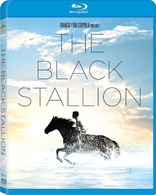
Movie rating
7.9 | / 10 |
Blu-ray rating
| Users | 3.9 | |
| Reviewer | 4.0 | |
| Overall | 3.9 |
Overview
The Black Stallion (1979)
When a shipwreck leaves young Alec and the black stallion, a wild Arabian, stranded on a desolate island, the two share a frightening adventure of survival that forges a lasting bond of friendship between them. Upon their rescue, Alec and the magnificent horse continue their adventures when they join forces with ex-jockey and horse trainer Henry Dailey.
Starring: Kelly Reno, Mickey Rooney, Teri Garr, Clarence Muse, Hoyt AxtonDirector: Carroll Ballard
| Coming of age | Uncertain |
| Family | Uncertain |
| Sport | Uncertain |
| Adventure | Uncertain |
Specifications
Video
Video codec: MPEG-4 AVC
Video resolution: 1080p
Aspect ratio: 1.85:1
Original aspect ratio: 1.85:1
Audio
English: DTS-HD Master Audio 5.1 (48kHz, 24-bit)
Spanish: Dolby Digital Mono
French: DTS-HD Master Audio Mono
Italian: DTS-HD Master Audio Mono
German: DTS-HD Master Audio Mono
Spanish: DTS-HD Master Audio Mono
Spanish DD=Latin
Subtitles
English SDH, French, German, Italian, Spanish, Greek, Indonesian, Korean, Mandarin (Simplified), Mandarin (Traditional), Thai
Discs
50GB Blu-ray Disc
Single disc (1 BD)
Playback
Region A, B (C untested)
Review
Rating summary
| Movie | 4.5 | |
| Video | 3.5 | |
| Audio | 4.0 | |
| Extras | 0.5 | |
| Overall | 4.0 |
The Black Stallion Blu-ray Movie Review
A Boy and His Horse
Reviewed by Michael Reuben March 26, 2014Director Carroll Ballard was a UCLA classmate of Francis Ford Coppola, whose Zoetrope Studios produced Ballard's debut feature The Black Stallion, with Coppola prominently listed as executive producer. Adapted from the classic children's novel by Walter Farley, The Black Stallion premiered in 1979, the same year as another Zoetrope production, Coppola's own Apocalypse Now. Though made for a fraction of the cost, Ballard's film has proven to be as durable as his patron's, in large part because of Ballard's unique ability to evoke a sense of elemental wonder through seemingly casual and uncomposed images. Study them carefully, though, and it becomes clear that there's nothing casual about them. Ballard and his cinematographer, Caleb Deschanel (who would reunite for Fly Away Home), compose deliberately, and the film's editor, Robert Dalva (Captain America: The First Avenger), was nominated for an Oscar for the unobtrusive precision with which he assembled their shots. The result was acclaimed at the time and has remained a family classic ever since.
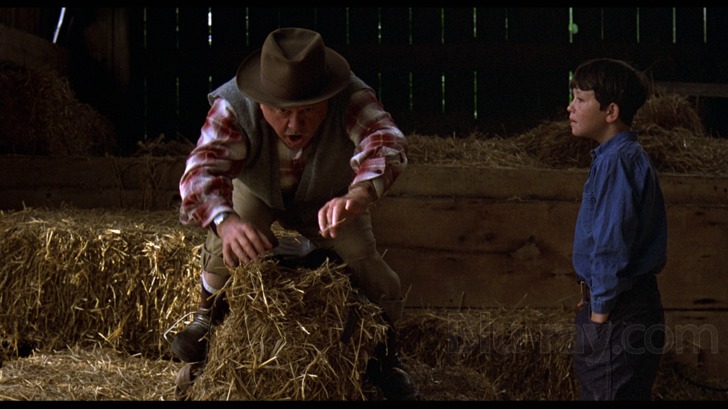
Since Farley's book was published in 1941, The Black Stallion presumably occurs sometime in the 1930s. The technology and decor are consistent with this period, leaving aside a few anachronisms, but the time is never stated, because the story is told entirely from a young boy's point of view. Alec Ramsey (Kelly Reno) is an American traveling on a steamer ship with his father (Hoyt Axton) for reasons that are never explained (and don't need to be). Alec sees an imposing wild Arabian stallion restrained by harness and ropes in a storage area rigged as a stable. When he tries to feed the animal some sugar cubes, he is shooed away by an angry man speaking Arabic. Alec's father has had a good night playing cards, and he gives the boy a small statue of Bucephalus, the horse ridden by another Alec, Alexander the Great. The figure will shortly become a talisman connecting Alec to his past and pointing toward his future, because that night the steamer's engines explode and the ship sinks, killing all aboard except Alec, who is thrown into the sea and saves himself by clinging to the stallion's ropes as the horse swims away from the wreckage. Alec awakens on a deserted island that "The Black", as Alec now calls him, has managed to reach. For over thirty minutes with barely a word, Alec and The Black develop a strange friendship, born as much of loneliness as of the need to survive. When they are eventually rescued by a fishing trawler, Alec insists that The Black be brought with him home to America. His mother (Teri Garr) is happy to discover that one of the two men in her life has survived, but now she has the challenge of single parenthood to a boy on the cusp of manhood. She also has a wild horse in her suburban back yard. The Black is far too wild to remain quietly behind Alec's house for long. When it takes off down the street one morning, Alec spends a day and night looking for it, and eventually encounters a former racing jockey and would-be farmer named Henry Dailey. Dailey is played by Hollywood legend Mickey Rooney in an Oscar-nominated performance of exceptional taste and restraint, where a headliner of the old studio system utterly disappears into a weary old man, suddenly revitalized by a young boy's enthusiasm and a horse of extraordinary speed. It's never explained why Alec wants to ride The Black in a race. Much energy and scheming are devoted to the enterprise, including getting around Mrs. Ramsey's opposition—she relents in the face of what she recognizes is an unstoppable force of nature—and the fact that The Black has no "papers" giving him official status. Dailey solves that problem through clever manipulation of the press in the form of a popular radio reporter named Neville (Michael Higgins). But what is the ultimate purpose? As an elderly local cartman named Snoe (Clarence Muse) tells Alec, The Black is too wild a spirit ever to be fully trained. Indeed, when Alec tries to guide the horse into the starting gate at the Santa Anita track for the event that serves as the film's climax, The Black protests so violently that Alec almost loses control. Are Alec and The Black concluding some journey that began in the turbulent waters of the Atlantic Ocean? Is Alec fulfilling some rite of mourning for the father whose last major act was to tell his son an enchanting story about a boy who rode a wild horse? Is he fulfilling a dream for Henry Dailey, the man who has become his surrogate father? All of these possibilities (and more) hover over the film. In a contemporary studio product, a producer or executive would no doubt insist that one of them be chosen, underlined and provided to the audience with big quotation marks so that no one would complain about unanswered questions on a test screening survey card. But Ballard doesn't care about answering questions. He's more interested in conveying the texture of experience itself: of Dailey teaching Alec to ride, of meeting Neville at the track in the driving rain, of the train ride to Santa Anita and the weigh-in of the jockeys before the race and the tension of the race itself. Above all, Ballard keeps coming back to the unspoken bond between Alec and The Black, which can't and shouldn't be put into words.
The Black Stallion Blu-ray Movie, Video Quality 
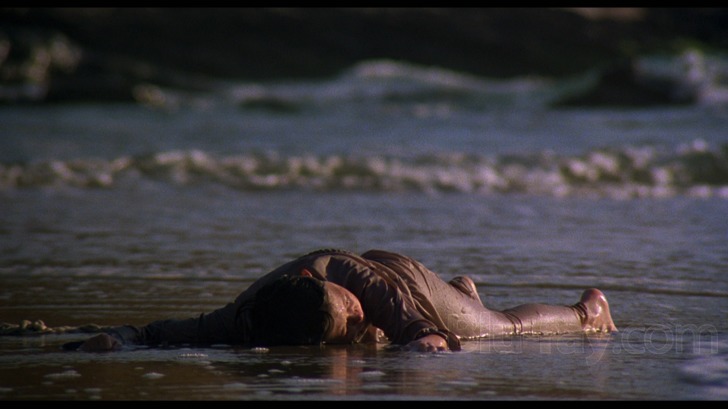
Because MGM's screener for The Black Stallion only recently arrived, I had already heard tales of a "botched" transfer from users who acquired retail copies. MGM's catalog output is well known for being erratic, even when a title is promoted with great fanfare, with results ranging from the exceptional (e.g., the remastered Robocop) to the disappointing (such as the controversial release of The Great Escape). Titles released "under the radar" have been similarly unpredictable; the remastered Terminator looked terrific, but some of the studio's "90th Anniversary" reissues have featured the same disappointing transfers and encodes issued in the early days of Blu-ray (e.g., Bull Durham). MGM's 1080p, AVC-encoded Blu-ray for The Black Stallion looks reasonably good for a catalog title on which a basic effort was expended to bring the film to hi-def, but not the extensive investment of money, time and resources that, in a world without practical limits, would be expended on every transfer for Blu-ray. The elements appear to be in good shape. Black levels and detail are generally more than acceptable, although much of the early part of the film (on the ship and in the water) and some later scenes (e.g., the downpour at the track where Neville first sees The Black) are exceptionally dark and always have been. By contrast, the scenes on the island, at Alec's home and at Dailey's farm are bright enough and have sufficient contrast to reveal a wealth of detail. Perhaps a better scan and more refined tweaking at the digital workstation could reveal additional layers of information, but I doubt that the film's visual texture would change significantly. The colors are vividly rendered: the various blues of the island waters, the greens of the Ramsey backyard, the nostalgic hues of their tree-lined street, the earth tones of Dailey's place and, of course, the jockeys' distinctive uniforms in the final race. Also memorable is the bright orange flame of the steamship as it sinks into the sea. The film's grain structure is very much in evidence in darker scenes, probably too much for some viewers' tastes. In brighter scenes, the grain is less obvious but still present. I saw no evidence of grain reduction or artificial sharpening (concepts which tend to be used interchangeably on internet forums but signify entirely different forms of digital manipulation). At an average bitrate of 32.89 Mbps, MGM has provided more than enough bandwidth to handle the film's many complex scenes of motion involving The Black's energetic and often unpredictable interactions with humans.
The Black Stallion Blu-ray Movie, Audio Quality 
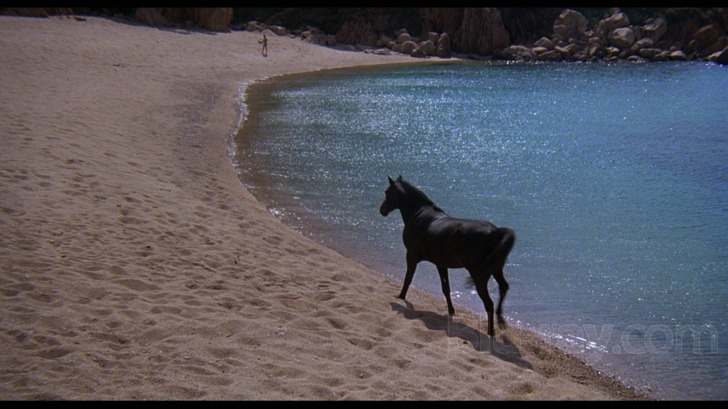
The Black Stallion was released in stereo. Its supervising sound editor, Alan Splet, was awarded a special achievement Oscar for his work. According to IMDb, a six-track mix was also prepared for 70mm exhibition, but I was not able to verify this. MGM's 1997 DVD contained a stereo track, but the Blu-ray's soundtrack offers a 5.1 remix presented in lossless DTS-HD MA. The remix has good points and bad points. The dynamic range is impressive, with surprisingly deep bass extension during key scenes like the sinking of the ship and the racing sequence. The force, precision and directionality with which The Black's hoof beats are rendered as it runs this way and that, and as the film's point of view shifts, add an important element of realism to the visuals. The roar of the crowd at Santa Anita and the pounding of the other horses contribute to the visceral excitement of the film's climactic sequence. The dialogue, however, sometimes sounds slightly detached. Some of this is undoubtedly due to looping made necessary by the difficulty of capturing clean production sound while working with live animals. Some of it may be a byproduct of "opening up" the original mix to create a 5.1 track. Whatever the cause, the effect would be more jarring if the film depended on its dialogue, but for much of the running time, conversation is almost irrelevant. The score by Carmine Coppola is in a wholly different register than his more familiar work for the Godfather films. By turns sober, playful and soaring, it perfectly suits the film's shifting tones.
The Black Stallion Blu-ray Movie, Special Features and Extras 
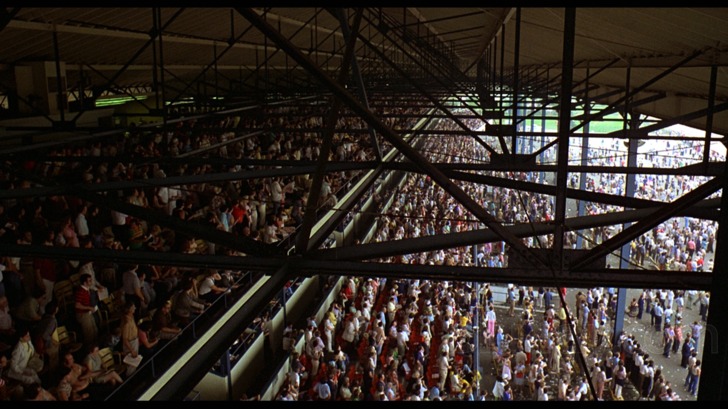
Except for a trailer (1080p; 1.85:1; 1:59), the disc has no extras. MGM continues to employ its user-unfriendly approach to catalog titles in which it provides no main menu, uses BD-Java and withholds the ability to bookmark your place so that you can return to it after stopping playback. (Universal has adopted the same approach, but their discs automatically save your stopping point and offer you the option to resume from that time mark.)
The Black Stallion Blu-ray Movie, Overall Score and Recommendation 
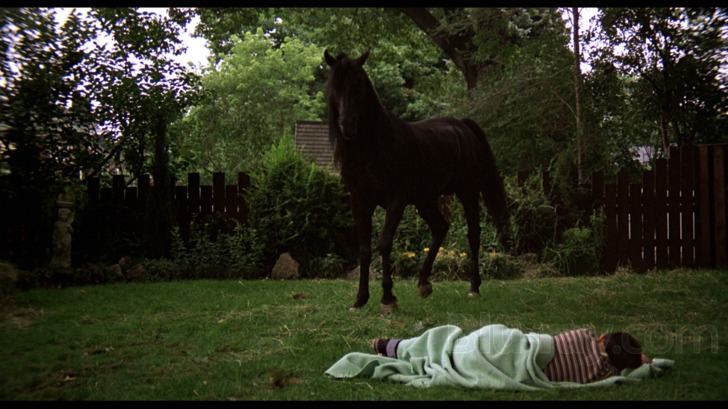
It is worth remembering that, even for its time, The Black Stallion was a low-budget film. It could no doubt look better, but it certainly doesn't look bad. When one speaks of Ballard as a "visual" director, the reference is to his sense of composition, his placement of people, animals and objects in relation to each other in the frame, and his ability to convey relationships wordlessly through gestures and expressions. Though perhaps not the absolute best presentation possible, MGM's Blu-ray of this magical film presents Ballard's work with the bulk of its visual information intact and is therefore recommended.
Similar titles
Similar titles you might also like

Swiss Army Man
2016

Captains Courageous
1937

Dirigible 4K
SDR
1931

Walkabout 4K
1971

The Master
2012

Life of Pi 4K
2012

Flashbacks of a Fool
2008

Beasts of the Southern Wild
2012

Free Willy
1993

Moonlight 4K
2016

White Squall
1996

Moby Dick
2011

Lost Horizon
1937

Adore
Perfect Mothers
2013

Dolphin Tale
2011

24 Frames
2017

Little Fugitive
Special Edition
1953

Gerry
2002

Mine
2016

Lord of the Flies
1963
